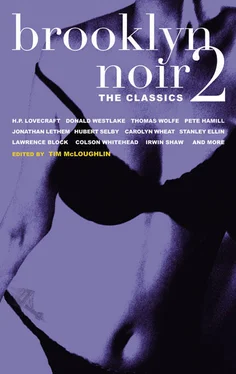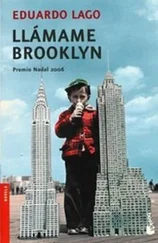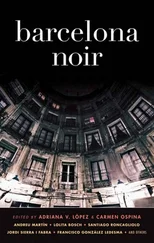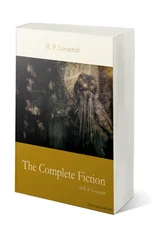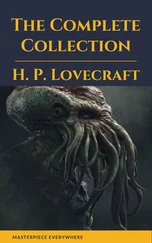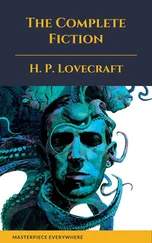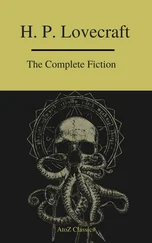H. Lovecraft - Brooklyn Noir 2
Здесь есть возможность читать онлайн «H. Lovecraft - Brooklyn Noir 2» весь текст электронной книги совершенно бесплатно (целиком полную версию без сокращений). В некоторых случаях можно слушать аудио, скачать через торрент в формате fb2 и присутствует краткое содержание. Год выпуска: 2005, ISBN: 2005, Издательство: Akashic Books, Жанр: Детектив, на английском языке. Описание произведения, (предисловие) а так же отзывы посетителей доступны на портале библиотеки ЛибКат.
- Название:Brooklyn Noir 2
- Автор:
- Издательство:Akashic Books
- Жанр:
- Год:2005
- ISBN:978-1888451764
- Рейтинг книги:4 / 5. Голосов: 1
-
Избранное:Добавить в избранное
- Отзывы:
-
Ваша оценка:
- 80
- 1
- 2
- 3
- 4
- 5
Brooklyn Noir 2: краткое содержание, описание и аннотация
Предлагаем к чтению аннотацию, описание, краткое содержание или предисловие (зависит от того, что написал сам автор книги «Brooklyn Noir 2»). Если вы не нашли необходимую информацию о книге — напишите в комментариях, мы постараемся отыскать её.
Brooklyn Noir 2 — читать онлайн бесплатно полную книгу (весь текст) целиком
Ниже представлен текст книги, разбитый по страницам. Система сохранения места последней прочитанной страницы, позволяет с удобством читать онлайн бесплатно книгу «Brooklyn Noir 2», без необходимости каждый раз заново искать на чём Вы остановились. Поставьте закладку, и сможете в любой момент перейти на страницу, на которой закончили чтение.
Интервал:
Закладка:
“Not a chance in a million. What’s he done that a few hundred other clucks in New York don’t do every year? Sorry, Abe, I’d like to do you the favor, but it’s no go.”
Levine sighed. “Okay, Dan,” he said. “If you say so.”
“Sorry,” said Ricco. He grinned at Perkins. “Sorry, kid,” he said. “You should of knifed a chorus girl or something.”
Ricco left and Levine glanced at Crawley, who was industriously yanking on his earlobe and looking bewildered. Levine sat down facing Perkins and said, “Well?”
“Let me alone a minute,” snarled Perkins. “I’m trying to think.”
“I was right, wasn’t I?” asked Levine. “You wanted to go out in a blaze of glory.”
“All right, all right. Al took his way, I took mine. What’s the difference?”
“No difference,” said Levine. He got wearily to his feet, and headed for the door. “I’ll have you sent back to your cell now.”
“Listen,” said Perkins suddenly. “You know I didn’t kill him, don’t you? You know he committed suicide, don’t you?”
Levine opened the door and motioned to the two uniformed cops waiting in the hall.
“Wait,” said Perkins desperately.
“I know, I know,” said Levine. “Gruber really killed himself, and I suppose you burned the note he left.”
“You know damn well I did.”
“That’s too bad, boy.”
Perkins didn’t want to leave. Levine watched deadpan as the boy was led away, and then he allowed himself to relax, let the tension drain out of him. He sagged into a chair and studied the veins on the backs of his hands.
Crawley said, into the silence, “What was all that about, Abe?”
“Just what you heard.”
“Gruber committed suicide?”
“They both did.”
“Well — what are we going to do now?”
“Nothing. We investigated; we got a confession; we made an arrest. Now we’re done.”
“But—”
“But hell!” Levine glared at his partner. “That little fool is gonna go to trial, Jack, and he’s gonna be convicted and go to the chair. He chose it himself. It was his choice. I’m not railroading him; he chose his own end. And he’s going to get what he wanted.”
“But listen, Abe—”
“I won’t listen!”
“Let me — let me get a word in.”
Levine was on his feet suddenly, and now it all came boiling out, the indignation and the rage and the frustration. “Damn it, you don’t know yet! You’ve got another six, seven years yet. You don’t know what it feels like to lie awake in bed at night and listen to your heart skip a beat every once in a while, and wonder when it’s going to skip two beats in a row and you’re dead. You don’t know what it feels like to know your body’s starting to die, it’s starting to get old and die and it’s all downhill from now on.”
“What’s that got to do with—”
“I’ll tell you what! They had the choice ! Both of them young, both of them with sound bodies and sound hearts and years ahead of them, decades ahead of them. And they chose to throw it away! They chose to throw away what I don’t have any more. Don’t you think I wish I had that choice? All right! They chose to die, let ’em die!”
Levine was panting from exertion, leaning over the desk and shouting in Jack Crawley’s face. And now, in the sudden silence while he wasn’t speaking, he heard the ragged rustle of his breath, felt the tremblings of nerve and muscle throughout his body. He let himself carefully down into a chair and sat there, staring at the wall, trying to get his breath.
Jack Crawley was saying something, far away, but Levine couldn’t hear him. He was listening to something else, the loudest sound in all the world. The fitful throbbing of his own heart.
The men in black raincoats
by Pete Hamill
South Slope
(Originally published in 1977)
It was close to midnight on a Friday evening at Rattigan’s Bar and Grill. There were no ball games on the television, old movies only made the clientele feel more ancient, and the jukebox was still broken from the afternoon of Red Cioffi’s daughter’s wedding. So it was time for Brendan Malachy McCone to take center stage. He motioned for a fresh beer, put his right foot on the brass rail, breathed in deeply, and started to sing.
Oh, the Garden of Eden has vanished, they say,
But I know the lie of it still,
Just turn to the left at the bridge of Finaghy,
And meet me halfway to Coote Hill …
The song was very Irish, sly and funny, the choruses full of the names of long-forgotten places, and the regulars loved Brendan for the quick jaunty singing of it. They loved the roguish glitter in his eyes, his energy, his good-natured boasting. He was, after all, a man in his fifties now, and yet here he was, still singing the bold songs of his youth. And on this night, as on so many nights, they joined him in the verses.
The boy is a man now,
He’s toil-worn, he’s tough,
He whispers, “Come over the sea”
Come back, Patty Reilly, to Bally James Duff,
Ah, come back, Patty Reilly, to me …
Outside, rain had begun to fall, a cold Brooklyn rain, driven by the wind off the harbor, and it made the noises and the singing and the laughter seem even better. Sardines and crackers joined the glasses on the bar. George the bartender filled the empties. And Brendan shifted from jauntiness to sorrow.
If you ever go across the sea to Ireland,
Then maybe at the closing of your day …
The mood of the regulars hushed now, as Brendan gave them the song as if it were a hymn. The bar was charged with the feeling they all had for Brendan, knowing that he had been an IRA man long ago, that he had left Ireland a step ahead of the British police who wanted him for the killing of a British soldier in the Border Campaign. This was their Brendan: the Transit Authority clerk who had once stood in the doorways of Belfast, with the cloth cap pulled tight on his brow, the pistol deep in the pockets of the trenchcoat, ready to kill or to die for Ireland.
Oh, the strangers came and tried to teach us their ways,
And scorned us just for being what we are …
The voice was a healthy baritone, a wealth of passion overwhelming a poverty of skill, and it touched all of them, making the younger ones imagine the streets of Belfast today, where their cousins were still fighting, reminding the older ones of peat fires, black creamy stout, buttermilk in the morning. The song was about a vanished time, before rock and roll and women’s liberation, before they took Latin out of the Mass, before the blacks and the Puerto Ricans had begun to move in and the children of the Irish had begun to move out. The neighborhood was changing, all right. But Brendan Malachy McCone was still with them, still in the neighborhood.
A little after midnight two strangers came in, dressed in black raincoats. They were wet with rain. They ordered whiskey. Brendan kept singing. Nobody noticed that his voice faltered on the last lines of “Galway Bay,” as he took the applause, glanced at the strangers, and again shifted the mood.
Oh, Mister Patrick McGinty,
An Irishman of note,
He fell into a fortune — and
He bought himself a goat …
The strangers drank in silence.
At closing time the rain was still pelting down. Brendan stood in the open doorway of the bar with Charlie the Pole and Scotch Eddie, while George the bartender counted the receipts. Everyone else had gone home.
“We’ll have to make a run for it,” Charlie said.
“Dammit,” Scotch Eddie said.
Читать дальшеИнтервал:
Закладка:
Похожие книги на «Brooklyn Noir 2»
Представляем Вашему вниманию похожие книги на «Brooklyn Noir 2» списком для выбора. Мы отобрали схожую по названию и смыслу литературу в надежде предоставить читателям больше вариантов отыскать новые, интересные, ещё непрочитанные произведения.
Обсуждение, отзывы о книге «Brooklyn Noir 2» и просто собственные мнения читателей. Оставьте ваши комментарии, напишите, что Вы думаете о произведении, его смысле или главных героях. Укажите что конкретно понравилось, а что нет, и почему Вы так считаете.
